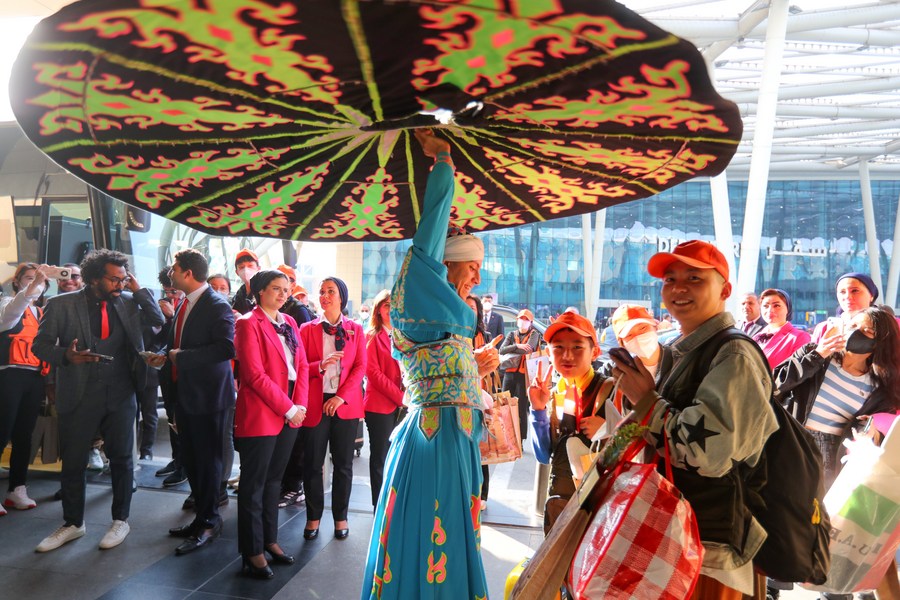Arab artists inspired by Xi's reply, pledging to advance cultural exchanges

An Egyptian artist performs a traditional Egyptian folk dance to welcome Chinese tourists at the Cairo International Airport in Cairo, Egypt, Jan. 20, 2023. (Xinhua/Sui Xiankai)
Chinese President Xi Jinping recently wrote back to representatives of well-known Arab artists who participated in the "Silk Road Artists' Rendezvous" visit to China, encouraging them to create more artworks that reflect China-Arab friendship and make new contributions to enhancing friendship between their people.
Some Arab artists told Xinhua that they are deeply inspired by Xi's reply, pledging to promote exchanges between Chinese and Arab cultures.
Egyptian artist Ibrahim El-Desouki Fahmy "has a strong feeling of pride and delight" when he learned the contents of the letter.
The artist, who taught art at Cairo University from 1992 to 1997, joined some 50 famous Arab artists to write the letter to Xi recently.
"President Xi's words touched my heart, especially his emphasis on the role that culture and art can play in promoting understanding and fostering mutual learning between China and the Arab countries," he said.
Xi said in the letter that culture can connect hearts, and art can interlink the world.
He also noted that from the opening of the ancient Silk Road to the Belt and Road cooperation, exchanges between Chinese and Arab civilizations have spanned thousands of years with mutual appreciation, writing a historical legacy of mutual learning.
Ahmed Nawar, an Egyptian artist who is a co-author of the letter to Xi, said he was very happy when they received the reply from the Chinese president.
Talking about the reason why he wanted to write the letter to Xi, Nawar, a professor with the Faculty of Fine Art in Egypt's Helwan University, said, "I felt it is my duty to express the feelings of artists regarding the progress we saw in China in all fields, especially the artistic, cultural and civilizational spheres."
Describing the journeys as "inspiring at all realms, including human, cultural, and artistic," Nawar said that he also wanted to promote the dialogue between Arab and Chinese civilizations and enhance their artistic and cultural exchanges.
After learning that Xi has replied to the Arab artists, 76-year-old Algerian artist Djemai Rashid, who joined a group of Arab artists on a trip to China in 2012 and attended the Beijing International Art Biennale in 2019, decided to print the letter and treasure it up.
"It was a great honor to receive a reply from President Xi Jinping," he said, hailing Xi as a great leader who highly regards the development of culture and art, as well as cultural exchanges.
He said he was impressed by Xi's promotion of dialogue among civilizations as well as of cultural mutual learning on many occasions, such as the China-Arab States Summit held last December.
While praising China for its "incredible progress" in the field of arts, Rashid hoped that artists from Arab countries and China would have more opportunities to interact, learn from each other and improve together.
Palestinian artist from the Gaza Strip Majed Shala said that the Arabs have witnessed the progress in China's economic development, and that an important factor that facilitates China's fast development is its "ancient and splendid civilization."
China and Arab countries have achieved fruitful cooperation in political, economic and other fields in recent years, and it is necessary to strengthen cultural exchanges, which will help more Palestinians and Arabs understand China, a country with a rich history, said Shala.
In this regard, he lauded the eight major cooperation initiatives proposed by Xi during his visit to Saudi Arabia late last year, which included the promotion of inter-civilizational dialogue between China and Arab countries.
Chinese and Arab civilizations are two important civilizations in the world, while culture and art are important bridges for promoting exchanges between peoples, Shala said.
With the common will of the leaders from both China and Arab countries, cooperation in the cultural field will be further strengthened in the future, he said.
Zeina Barhoum, a Jordanian soprano and founder of the Amman Opera Festival, has been invited to perform in China for several times and has released an album titled "Alcantara II, Zeina in China," which includes a song called "The Dream of Silk Road," a duet with a Chinese tenor.
The album seeks to review the history of the ancient Silk Road and the long-standing China-Arab friendship, as well as to promote cultural communication between China and the Arab world, Barhoum said, adding that Chinese and Arab artists, including singers, can play a greater role in deepening bilateral cooperation, promoting people-to-people bonds and strengthening mutual learning between the two civilizations.
On the China-proposed Global Civilization Initiative, she said that artists need to pay more attention to the inheritance and innovation of civilization, which can tap the value of the times in history and culture, and promote the innovative development of traditional culture in various countries.